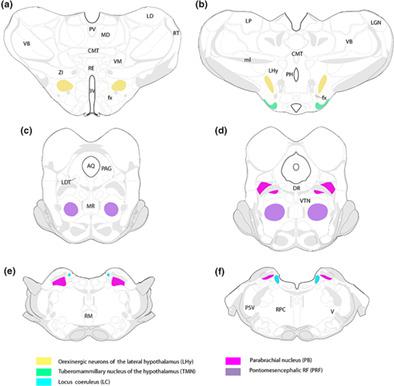当前位置:
X-MOL 学术
›
J. Comp. Neurol.
›
论文详情
Our official English website, www.x-mol.net, welcomes your
feedback! (Note: you will need to create a separate account there.)
No cognitive processing in the unconscious, anesthetic-like, state of sleep.
The Journal of Comparative Neurology ( IF 2.3 ) Pub Date : 2020-05-30 , DOI: 10.1002/cne.24963 Robert P Vertes 1, 2 , Stephanie B Linley 1, 2
The Journal of Comparative Neurology ( IF 2.3 ) Pub Date : 2020-05-30 , DOI: 10.1002/cne.24963 Robert P Vertes 1, 2 , Stephanie B Linley 1, 2
Affiliation

|
We review evidence challenging the hypothesis that memories are processed or consolidated in sleep. We argue that the brain is in an unconscious state in sleep, akin to general anesthesia (GA), and hence is incapable of meaningful cognitive processing—the sole purview of waking consciousness. At minimum, the encoding of memories in sleep would require that waking events are faithfully transferred to and reproduced in sleep. Remarkably, however, this has never been demonstrated, as waking experiences are never truly replicated in sleep but rather appear in very altered or distorted forms. General anesthetics (GAs) exert their effects through endogenous sleep–wake control systems and accordingly GA and sleep share several common features: sensory blockade, immobility, amnesia and lack of awareness (unconsciousness). The loss of consciousness in non‐REM (NREM) sleep or to GAs is characterized by: (a) delta oscillations throughout the cortex; (b) marked reductions in neural activity (from waking) over widespread regions of the cortex, most pronounced in frontal and parietal cortices; and (c) a significant disruption of the functional connectivity of thalamocortical and corticocortical networks, particularly those involved in “higher order” cognitive functions. Several (experimental) reports in animals and humans have shown that disrupting the activity of the cortex, particularly the orbitofrontal cortex, severely impairs higher order cognitive and executive functions. The profound and widespread deactivation of the cortex in the unconscious states of NREM sleep or GA would be expected to produce an equivalent, or undoubtedly a much greater, disruptive effect on mnemonic and cognitive functions. In conclusion, we contend that the unconscious, severely altered state of the brain in NREM sleep would negate any possibility of cognitive processing in NREM sleep.
中文翻译:

在无意识的、类似麻醉的、睡眠状态下没有认知处理。
我们审查了挑战记忆在睡眠中被处理或巩固的假设的证据。我们认为,大脑在睡眠中处于无意识状态,类似于全身麻醉 (GA),因此无法进行有意义的认知处理——这是清醒意识的唯一权限。至少,睡眠中的记忆编码需要清醒的事件忠实地转移到睡眠中并在睡眠中再现。然而,值得注意的是,这从未被证明过,因为清醒的经历从未真正在睡眠中复制,而是以非常改变或扭曲的形式出现。全身麻醉剂 (GA) 通过内源性睡眠-觉醒控制系统发挥作用,因此 GA 和睡眠具有几个共同特征:感觉阻滞、不动、健忘和缺乏意识(无意识)。非快速眼动 (NREM) 睡眠或 GA 的意识丧失的特点是: (a) 整个皮层的 delta 振荡;(b) 大脑皮层广泛区域的神经活动(从清醒时)显着减少,在额叶和顶叶皮层最为明显;(c) 丘脑皮质和皮质皮质网络的功能连接受到严重破坏,尤其是那些涉及“高级”认知功能的网络。动物和人类的几项(实验)报告表明,破坏皮层,特别是眶额皮层的活动,会严重损害高级认知和执行功能。在 NREM 睡眠或 GA 的无意识状态下,皮层的深度和广泛的失活预计会产生等效的,或者无疑是更大的,对记忆和认知功能的破坏性影响。总之,我们认为 NREM 睡眠中大脑的无意识、严重改变的状态将否定 NREM 睡眠中认知处理的任何可能性。
更新日期:2020-05-30
中文翻译:

在无意识的、类似麻醉的、睡眠状态下没有认知处理。
我们审查了挑战记忆在睡眠中被处理或巩固的假设的证据。我们认为,大脑在睡眠中处于无意识状态,类似于全身麻醉 (GA),因此无法进行有意义的认知处理——这是清醒意识的唯一权限。至少,睡眠中的记忆编码需要清醒的事件忠实地转移到睡眠中并在睡眠中再现。然而,值得注意的是,这从未被证明过,因为清醒的经历从未真正在睡眠中复制,而是以非常改变或扭曲的形式出现。全身麻醉剂 (GA) 通过内源性睡眠-觉醒控制系统发挥作用,因此 GA 和睡眠具有几个共同特征:感觉阻滞、不动、健忘和缺乏意识(无意识)。非快速眼动 (NREM) 睡眠或 GA 的意识丧失的特点是: (a) 整个皮层的 delta 振荡;(b) 大脑皮层广泛区域的神经活动(从清醒时)显着减少,在额叶和顶叶皮层最为明显;(c) 丘脑皮质和皮质皮质网络的功能连接受到严重破坏,尤其是那些涉及“高级”认知功能的网络。动物和人类的几项(实验)报告表明,破坏皮层,特别是眶额皮层的活动,会严重损害高级认知和执行功能。在 NREM 睡眠或 GA 的无意识状态下,皮层的深度和广泛的失活预计会产生等效的,或者无疑是更大的,对记忆和认知功能的破坏性影响。总之,我们认为 NREM 睡眠中大脑的无意识、严重改变的状态将否定 NREM 睡眠中认知处理的任何可能性。











































 京公网安备 11010802027423号
京公网安备 11010802027423号